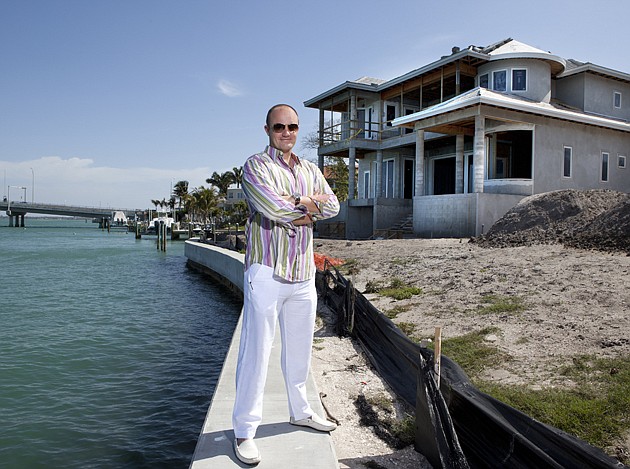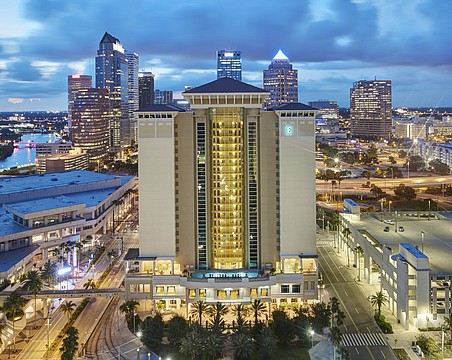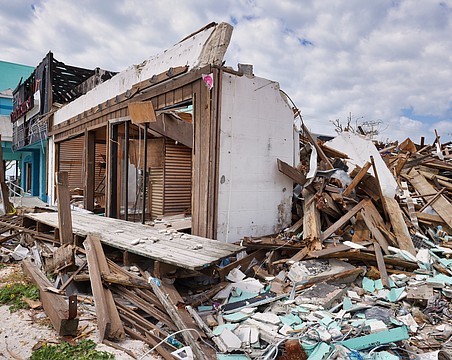About four years ago, Steven Hanson saw opportunity where others saw dilapidation.
In mid-2008, he purchased a duplex for $375,000 out of foreclosure at 312 64th St., in Holmes Beach, a barrier island community in Manatee County. He gutted it, fixed the roof and, with the help of a variance from the city, expanded it to three units, each with a private pool. After renting the property for a couple years, he sold it in 2010, to other investors for a total of $1.19 million.
Individually and in a variety of investor groups, Hanson repeated this process — more than 50 times by his estimation.
Yet the success wasn't enough for the high-octane Hanson. He wanted to do bigger projects, and get the bigger payoff that comes with them.
So he sold his rental inventory and began his latest high-risk, high-reward venture: building upscale single-family homes on speculation. Using this plan, he says he expects to make 20 years' worth of money in just five years' time.
Of course, the self-assured Hanson's bold claims become bolder in the context of the current luxury real estate market. While there were only 10 total residential sales of more than $4 million in Sarasota County in 2011, Hanson owns lots to build seven homes in that price range.
In addition, Hanson plans on purchasing another four waterfront lots in the coming weeks. His goal is to vault his companies, Modus Operandi Partners LP and Modus Construction LLC, near the top of the list of premier luxury homebuilders on the Gulf Coast.
To achieve his goals, the 38-year-old not only needs to be willing to risk his money, he needs to persuade investors to risk theirs as well. Hanson says he currently funds his projects with 50% of his own money, but his new business model would call for him to whittle that to 25% for his future projects, with the remainder coming from deep-pocketed investors.
Risky business
Hanson's plans amount to about $30 million worth of investment over the next two to three years. Yet that number — and the risk associated with it — doesn't scare the British transplant. He has some experience with risk.
Born and raised in a middle-class family in Liverpool, Hanson attended a prestigious private school, Merchant Taylors' School for Boys, prior to attending college at Bath University.
In 1997, after a brief turn on a semi-pro soccer team in Norway, the 23-year-old took a job on the equity trading team for the Japanese bank Nomura International PLC's London office. He eventually rose to the head of global portfolio sales trading. Four years later, he took a similar job with BNP Paribas.
“I will always say that if you can survive in that industry you can do just about anything in business,” Hanson says. “I can't do open heart surgery, but the skills I learned there about high-risk, high-reward would serve me just about anywhere else.”
In 2003, with the stress, long hours and need for independence weighing on him, he took a three-week trip to Africa that turned into a three-year residency. Having checked off white water rafting the Zambezi River, flying a fighter jet and swimming with great white sharks, Hanson developed a personal relationship and a love for Cape Town, South Africa.
A gasp of fresh air compared with his London life of 12-hour days on the trading desk, Hanson decided to stay and scratch a growing entrepreneurial itch by opening an art gallery.
The only problem was he wasn't making any money.
“I was very limited in my ability to make money as a foreigner,” he says. “To do that I would generally have to go back into finance in Johannesburg, which is this concrete city. The lifestyle there just wasn't worth it to me.”
At the same time, Hanson's father, Graham Hanson, head of the U.K. chicken distribution business SFC (Wholesale) Ltd., had started investing in rental housing on Bradenton Beach with Shawn Kaleta of Beach to Bay Construction Inc. (see “No Bust Zone”, Business Review Nov. 7, 2008).
So with an L-1 work visa, Hanson made the trek to Florida.
Using his equities-generated wealth, Hanson embarked on several deals alone. He also undertook several projects with Kaleta, his father and a variety of the other partners all with the goal of redeveloping island homes into upscale rentals with a higher density. In a lot of cases it meant taking small single-level homes, adding a second level, changing the layout and adding amenities such as a pool.
“We were buying five- to six-person vacation homes for $700,000, two blocks from the beach, fixing them up and grossing six figures a year in rental income,” he says. “These properties would rent out 30 to 40 weeks a year, no problem.”
Kaleta, who says he did 10 to 15 projects with Hanson, describes him as a quick learner.
“He didn't know the barrier islands nearly at all when he came here from South Africa,” Kaleta says. “But it hasn't take him a long to learn the market. We still do a lot of projects jointly today.”
Other people's money
A big part of his success is Hanson's appeal to outside investors. With his European background and a friendship with the head of a venture capital fund in Denmark, Hanson says he has attracted several high net-worth Europeans as investors.
Now, Hanson plans to up the gamble. He's moved his focus southward, targeting the region from mid-Longboat Key south to Siesta Key, Casey Key and Boca Grand. He's downsizing with fewer, more expensive properties and creating his own small construction firm. His construction business includes a team of four: two senior project managers, Hanson and his executive assistant.
His goal with construction costs is to be only slightly more expensive than comparably amenitized distressed real estate. Compared to these properties, Hanson says he'll have the advantage with new construction and warranties.
As for financing his projects, Hanson says he forgoes mortgages in favor of cash — both his own money and investors. This approach allows Hanson to take on several projects at once and, although he splits the profits with his investors, he saves money on interest he would pay on construction loans.
As for why he chooses to build on spec, Hanson says the average buyer of multimillion-dollar homes tends to be older and have a lower tolerance for long development periods.
“Buying a home is a very emotional transaction,” Hanson says. “People talk about how a house just feels right. The inventory is horrible at the top end. These are people who don't want to live in someone else's house.”
Jason Grande and Tom Cail, the top-producing sales team at Michael Saunders & Co.'s Siesta Key office, say there is room in the market for premium-priced new homes in Sarasota's first-class locations.
“The new-home market is actually a good niche right now,” says Grande. “There's a lot less new product out there. A $4 million sale today is probably closer to a $7.5 million sale. Really almost half of all waterfront sales are deals where the buildings are going to be torn down. So the actual costs for these homes is much more expensive. There should be a lot of buyers for a house-and-lot package.”
The rub, the two say, is if Hanson can maintain his profit margins to produce first-class housing. As the recent crash illustrated, speculation homebuilding is an especially difficult business and even experienced players can lose money.
Despite this history, Hanson says his instinct is to move forward. “A lot of people got burned by the recession,” Hanson says. “I think that aversion to risk is an over-correction. My appetite for risk is high. Partially it's my youth and partially it's my financial background. I've also run the numbers. I don't have trouble sleeping at night. History shows it's always the pioneers that survive competition.”
However, Hanson may have more spec competition in the near future.
“Builders are becoming more willing to build on spec now,” says T.J. Nutter owner of Sarasota-based Nutter Custom Homes. “Fortunately, or unfortunately, I'm not one of them, but I have sold and committed to building homes for a number of other buyers that are building for spec.”
Nutter says investors are slowly returning to the market because they have more surety of the downside risk.
“I guarantee if he has success there will be other people who will be following him,” Cail says.
SPECULATION IN PROGRESS
1435 West Way Drive, Sarasota, paid $2.6 million for vacant waterfront land; two single-family residences under construction, listed at $6.495 million and $5.795 million.
3800 Casey Key Road, Casey Key, paid $1.1 million for vacant Gulf-front land, one single-family residential home under construction, listed at $4.95 million.
107 Elm Ave., Anna Maria, paid $1.3 million vacant Gulf-front land, closing sale of new single-family residence for about $2.8 million.
3009 Avenue F, Holmes Beach, paid $779,000 for existing duplex, tore down and built new single-family residence and sold for $2.22 million.
2508-2516 Gulf Drive, Bradenton Beach (previously planned as the site of Rosa Del Mar), paid $2.64 million for five vacant Gulf-front parcels from FDIC, currently under construction review.
LINGERING CRITICISM
Hanson and Kaleta's rental projects haven't been universally hailed. Some area business owners, neighbors and city leaders on Holmes Beach and Anna Maria have complained that the developments are too big and out of character with the residential areas.
In response, Anna Maria city commissioners have started work on a residential building permit moratorium (Ordinance 12-741).
“These developer are trying to make money turning two-bedroom homes into six-bedroom homes,” Commissioner SueLynn says. “I really think it is greed driving all this. They don't care about the quality of life on Anna Maria, they just want to make their profit. Some of these firms are even advertising you can get as many as 18 people to stay in a single house.”
She says the proposed moratorium ordinance will give the commission time to create additional building and code enforcement rules, such as setbacks and parking restrictions, before the bigger rental properties can be built.
Hanson argues his developments are a significant improvement over the aged and sometimes dilapidated buildings they replace, and that tourism is ultimately what makes Anna Maria and the surrounding islands such wonderful areas.
No final decision has been made on the ordinance, but the city has halted the approval of new residential building permits until the commission addresses the issue.






